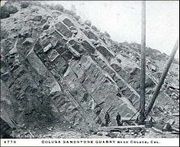Difference between revisions of "Colusa sandstone"
m (Text replace - "== Authority ==" to "== Sources Checked for Data in Record ==") |
|||
| (7 intermediate revisions by the same user not shown) | |||
| Line 1: | Line 1: | ||
| − | [[File: | + | [[File:Colusa sandstone quarry.jpg|thumb|Colusa Sandstone quarry]] |
== Description == | == Description == | ||
| − | A fine, even-grain, blue-gray sandstone quarried in Colusa County, California. Colusa sandstone is a moderately soft graywacke stone with a porous surface that has a tendency to spall with aging. It was used a dimension stone along the California coast and in the Hawaiian islands during the late 19th and early 20th centuries. Examples of its use in San Francisco include the Westin St. Francis Hotel, Trinity Episcopal Church, the flatiron Flood Building on Market Street, and the Ferry Building on the Embarcadero with its Beaux Arts façade and 240-foot tower. | + | A fine, even-grain, uniform blue-gray sandstone quarried in Colusa County, California that was excavated extensively for multiple stones including [[limestone]], [[marble]] and [[sandstone]]. Colusa sandstone was obtained from massive in beds east of the lakes extending to both the north and south. Colusa sandstone is a moderately soft graywacke stone with a porous surface that has a tendency to spall with aging. It was used a dimension stone along the California coast and in the Hawaiian islands during the late 19th and early 20th centuries. Examples of its use in San Francisco include the Westin St. Francis Hotel, Trinity Episcopal Church, the flatiron Flood Building on Market Street, and the Ferry Building on the Embarcadero with its Beaux Arts façade and 240-foot tower. The stone darkens slightly with weathering. |
== Additional Images == | == Additional Images == | ||
<gallery> | <gallery> | ||
| − | File: | + | File:SpreckelsMainImg.jpg|Spreckels Temple of Music, Golden Gate Park |
| − | File: | + | File:Flood-Building.jpg|Flood Building, San Francisco |
</gallery> | </gallery> | ||
| + | ==Resources and Citations== | ||
| − | + | * 'Stone Quarries and Beyond' Compiled by Peggy G. Perazzo, at http://quarriesandbeyond.org/states/ca/quarry_photo/ca-colusa_photos.html#john_morton (accessed May 2020) | |
| − | * | + | * Fred Gamble, Contributed information, Sept. 2007 |
* ''Dictionary of Building Preservation'', Ward Bucher, ed., John Wiley & Sons, Inc., New York City, 1996 | * ''Dictionary of Building Preservation'', Ward Bucher, ed., John Wiley & Sons, Inc., New York City, 1996 | ||
Latest revision as of 13:45, 2 July 2022
Description
A fine, even-grain, uniform blue-gray sandstone quarried in Colusa County, California that was excavated extensively for multiple stones including Limestone, Marble and Sandstone. Colusa sandstone was obtained from massive in beds east of the lakes extending to both the north and south. Colusa sandstone is a moderately soft graywacke stone with a porous surface that has a tendency to spall with aging. It was used a dimension stone along the California coast and in the Hawaiian islands during the late 19th and early 20th centuries. Examples of its use in San Francisco include the Westin St. Francis Hotel, Trinity Episcopal Church, the flatiron Flood Building on Market Street, and the Ferry Building on the Embarcadero with its Beaux Arts façade and 240-foot tower. The stone darkens slightly with weathering.
Additional Images
Resources and Citations
- 'Stone Quarries and Beyond' Compiled by Peggy G. Perazzo, at http://quarriesandbeyond.org/states/ca/quarry_photo/ca-colusa_photos.html#john_morton (accessed May 2020)
- Fred Gamble, Contributed information, Sept. 2007
- Dictionary of Building Preservation, Ward Bucher, ed., John Wiley & Sons, Inc., New York City, 1996
- Frank A. Lent, Trade names and Descriptions of Marbles, Limestones, Sandstones, Granites and Other Building Stones Quarried in the United States Canada and other Countries., Stone Publishing Co, New York, 1925


